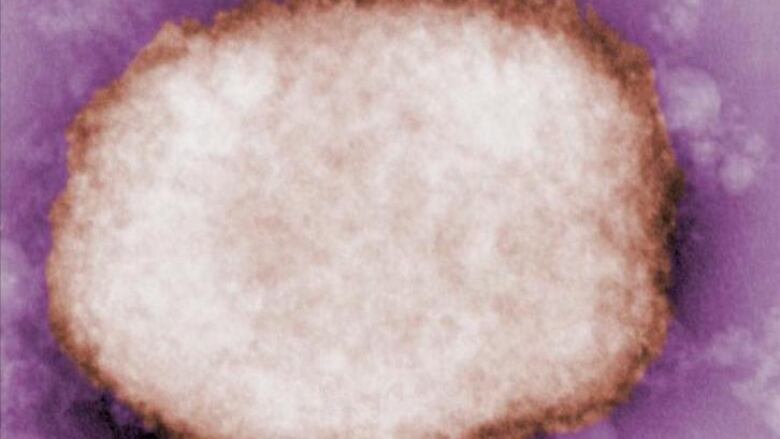Lessons learned from COVID-19 are 'silver lining' as we face Monkeypox virus, expert says
At least nine cases have been confirmed in Ontario so far

There are now 110confirmed cases of monkeypox in Canada, including at least nine in Ontario, according to Health Canada.
As of June 9, at least23 other cases were under investigation in Toronto and Halton Region Public Health confirmed its first case, whilethere have been noconfirmed cases in Hamilton, said Hamilton Public Health Services.
Karen Mossman, a virologist and professor of Pathology and Molecular Medicine at McMaster University, said the silver lining in a potential monkeypox outbreak could be the lessons we learned during the COVID-19 pandemic.
She said COVID-19 has increased awareness on how we should proceed with a potential outbreak.
"Many general practices put in place during COVID will help limit infection with monkeypox," she wrote in an email to CBC Hamilton.
"Hopefully COVID will normalize mask wearing, new working arrangements (and associated technologies), better ventilation systems, etc."

But she also warns that concern around an increase in local cases is warranted.
That concern could be linked to few people having immunity against monkeypox, Dr. Mossman explained.
"While the smallpox vaccine is thought to provide protection, vaccination for smallpox ended circa 1970 when the virus was effectively eradicated, and those vaccinated likely have limited remaining immunity," she said.
Fortunately, she said monkeypox doesn't spread as quickly as SARS-CoV-2, and doesn't mutate as quickly as coronaviruses.
"Monkeypox spreads through bites or scratches from an infected animal, or through direct contact with sores or bodily fluids from infected people (example during sex) or contaminated clothing, bedding etc.," she said.
Doctors need to be better at communicating with the public, expert says
Mossman says there were also lessons to be learned from COVID-19 about how doctors communicate with the public.
"I think there needs to be a balance between transparency and awareness, with reality based on the best available data and knowledge. The public has a right to be aware of what viruses are circulating, and could potentially form a new outbreak," she said.
"This is where it gets challenging, as we often don't know what we don't know, and as we gather more information, those messages change. We absolutely experienced this during COVID at the beginning there was a lot we did not know, but made assumptions (or best guesses) based on how similar SARS-CoV-2 was to SARS-CoV, and our experience with the pandemic in 2003."
Mossman says the general public needs to have more information in order to assess risk when it comes to outbreaks.
"By using the adage of 'trust me, I'm a doctor,'we aren't doing our job in really educating the public of why and how decisions/recommendations are made, which I think is critically important so that when the next pandemic happens, the public has a general awareness and can better understand what is happening, why, and should they be concerned or not," she said.
'Different spread patterns'
At the moment, Niagara Region Public Health is not aware of any local cases, according to an email to CBC Hamilton on Wednesday.
Dr. Azim Kasmani, associate medical officer of health at Niagara Region Public Health, said that it's "unlikely" that a pandemic could arise from the current outbreak.
"From what we know about monkeypox so far, it's unlikely to have the same global impact as COVID-19," he wrote.
"These are different viruses with different spread patterns and different health effects."
For now, Dr. Kasmani suggests steering clear of close and physical contact with others who could be infected with monkeypox, as well as to avoid sharing personal belongings with those individuals.
"As we enter the summer months when large outdoor gatherings and festivals become more common, it is important to think about how much close, skin-to-skin contact you will engage in when attending an event," he added.
Like Dr. Mossman, he agrees that people should be wary of monkeypox but that we could be slightly more prepared for outbreaks this time around.
"COVID-19 was a brand new virus, and humans had no immunity to it when it emerged," he said."Monkeypox, on the other hand, has been known for decades, we have seen it and managed it before."












_(720p).jpg)


 OFFICIAL HD MUSIC VIDEO.jpg)
.jpg)



























































































